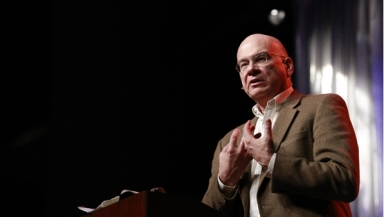
What happens when seemingly faithful Christians disagree and fall out?
There's been an interesting example of exactly this involving Billy Graham's grandson, Tullian Tchividjian (pronounced cha-vi-jin), and the Gospel Coalition.
The latter is a network of nearly 8,000 'broadly Reformed' churches found mostly in the United States but also Eastern Europe, Africa and the Far East. It's headed up by bestselling author and pastor Tim Keller and the theologian and New Testament professor Don Carson.
A theological dispute over the issue of sanctification or holiness became (ironically) "increasingly sharp and divisive," as Keller and Carson themselves admitted. As a result of it, Tchividjian was asked to remove his blog from their website with immediate effect, and he has now set up his own.
Harsh words were apparently involved. But fortunately that was not the end of the story, for Tchividjian then posted an apologetic blog post. His words are not only a good example of God working for good in all things with those who love him (Romans 8:28), but also give us all a masterclass in the art of gracious disagreement.
The first thing Tchividjian does is to apologise for the tone and content of some of the things he said. He then speaks warmly of those he fears he has hurt. And finally, he says: "I believe that the world is big enough and the harvest is ripe enough for well-meaning brothers and sisters to agree to disagree." You can read his full article here.
If only it were always that straightforward. The tendency of Christians to fall out and fragment is satirised in Garrison Keillor's autobiographical novel Lake Wobegon Days, which charts his family's part in the splintering of the Brethren after it left Anglicanism. "Once having tasted the pleasure of being Correct and defending True Doctrine," he writes, "they kept right on and broke up at every opportunity, until, by the time I came along, there were dozens of tiny Brethren groups."
Of course, there is a long history of splits among Christians. The 17<sup>th century Puritan Richard Baxter lamented in his book The Reformed Pastor: "Had the ministers of the gospel been men of peace, and of catholic, rather than factious spirits, the Church of Christ had not been in the case it now is."

Much more recently, the Anglican evangelical leader John Stott, interviewed in Third Way magazine 20 years ago, said: "We fragment over what we regard as issues of principle, but often the real reason is personal... When we're afraid, we withdraw into our own fellowships and ghettos."
Of course, we need to be careful. While some Christians are inclined to factionalism and fragmentation, others go to the opposite extreme and lack appropriate theological discernment – ignoring Jesus' warnings about false teachers (Matthew 7:15). The New Testament is much concerned with rebutting error, and Christ himself has strong words for some of the seven churches in Revelation because they were tolerating things that were wrong.
So there will be times when it is right to take a stand and draw a line. The art of gracious disagreement involves careful reading of Scripture and studying of church history to distinguish which matters of faith are primary issues of salvation that need defending – and which are subjects on which Christians may legitimately disagree.
Keller and Carson conclude their article by asking for prayer that their particular situation "will be marked on all sides by the startling, visible graciousness that should be present in all saved by grace". Whatever their differences, it looks like both they and Tchividjian have taught us all a lesson in how to handle these things better.
David Baker is a Church of England minister and journalist.

















